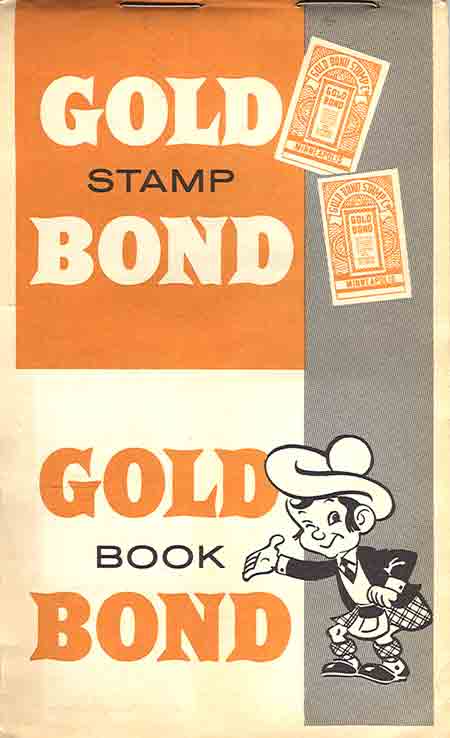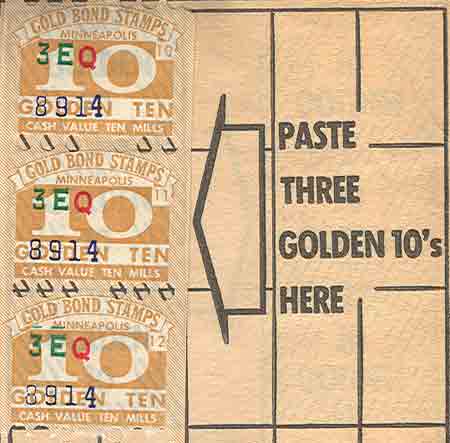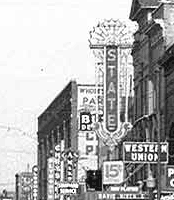
Gift Bond stamps were an also-ran around here, I think; the winners in the upper Midwest were Gold Bond, and S & H. Interesting tale about Gold Bond – Ah, heck, I suppose this means I have to find the dang things and scan them. Be right back. Here you go. I liked the design of S&H stamps as a kid; red and green, they looked like they were worth something. Gold Bond, as noted, was the main competition, and had a weird big-eared Scotsman who wore a condom with a marble on his head:
This Gold Stamp Bond Gold Book Bond book was my mom’s; it’s completely full, but unredeemed. No surprise; she was a saver. They gave Gold Bond stamps at the grocery store, and I remember the machines on the counter, right by the little platform on which you wrote your checks. My mom would let me lick them and put them in the book sometimes. I’d look at the thick books in the drawer, cinched with rubber bands, and think we were rich. They certainly made money for the fellow who founded the company – a canny bird named Curtis Carlson. I interviewed him for a magazine cover stoy in the mid-80s, and I was a bit daunted; I was Little Master Lileks, and he was this Captain of Industry with great reserves of quiet self-confidence. I remember what he said about the Depression: there was a lot of money to be made if you wanted to work. He was one of those kids who sold papers and caddied and shined shoes, and that was in the spare time off from his other nine jobs. His company was eventually valued at 16 bazillion dollars, or something like that. They bought TGIF Fridays, ran all the Country Kitchens, and of course have that little Radisson hotel brand you may have seen here and there. It all began with tiny little glued pieces of pseudo-money.
Did I say pseudo? Heck, it has a cash value. Ten mills! I like this one:
The Royal Turkeys Are Walking the Picket Line – for Values! They still sell “Festal” brand pumpkin-gunk, of course – took me many years to realize that was an actual word, and not an invented contraction or misspelling, like My-T-Fine. Spot the word that made me hit PRINT for this page:
“Eviscerated,” of course. Our promise to you: the turkeys have been had their guts scooped out! I do love, so very much, how “wrapped in vinyl plastic” was a selling point, not a rote condemnation of how fake and unnatural it was, maaaan. Note also how humans are involved in every step of the process except evisceration; apparently that’s done by God, or gentle, warm-handed ghosts. There’s one more, but I’ll save it for tomorrow. Oh, as for “Talk Turkey”: one site discusses the origins of the phrase. The history of "talk turkey" is obscure, and there are quite a few stories out there that try to explain it, but probably none of them is entirely correct. If someone says he wants to "talk turkey," he means he wants to have a direct conversation about what really matters. The most popular story about how this phrase entered the English language centers on hunting in America during the nineteenth century. Supposedly, Americans would sometimes work with native (American Indian) hunting companions, and at the end of the day the two hunters would divide the birds they had killed. The American would take the turkeys and offer the Native American the other birds (various stories suggest that these were crows or buzzards). The Native Americans would sometimes complain that their hunting companions would always take the better birds but "never talk turkey" for the Native Americans." In other words, if the Americans had been fair-if they had "talked turkey"-they would have taken the other birds some of the time. As with many such stories, this probably has a grain of truth to it, but people added to it over time. Oh, nonsense. What, exactly, would be the grain of truth? That there were muttered expressions of dissatisfaction over the divvying of poultry, and this invariably centered around a refusal to speak aloud the name of a specific bird? What are the chances that a phrase would arise from a conversation between two hunters and enter the advertising lexicon a century hence? Additional information on the fellow discussed in yesterday’s Bleat is here. I found this on my own with ten minutes of googling, but since the Powerline guys summed it up well I’ll link to them. More tomorrow – including a Holiday Diner hosted on another site to get around my current bandwidth restrictions. Since this one won’t be posted to the iTunes account, and since the other host has limited space, drop by early, if you care. See tomorrow. (No Fargo / Money updates this week - it's a holiday.)
|
||||||||||||||||








